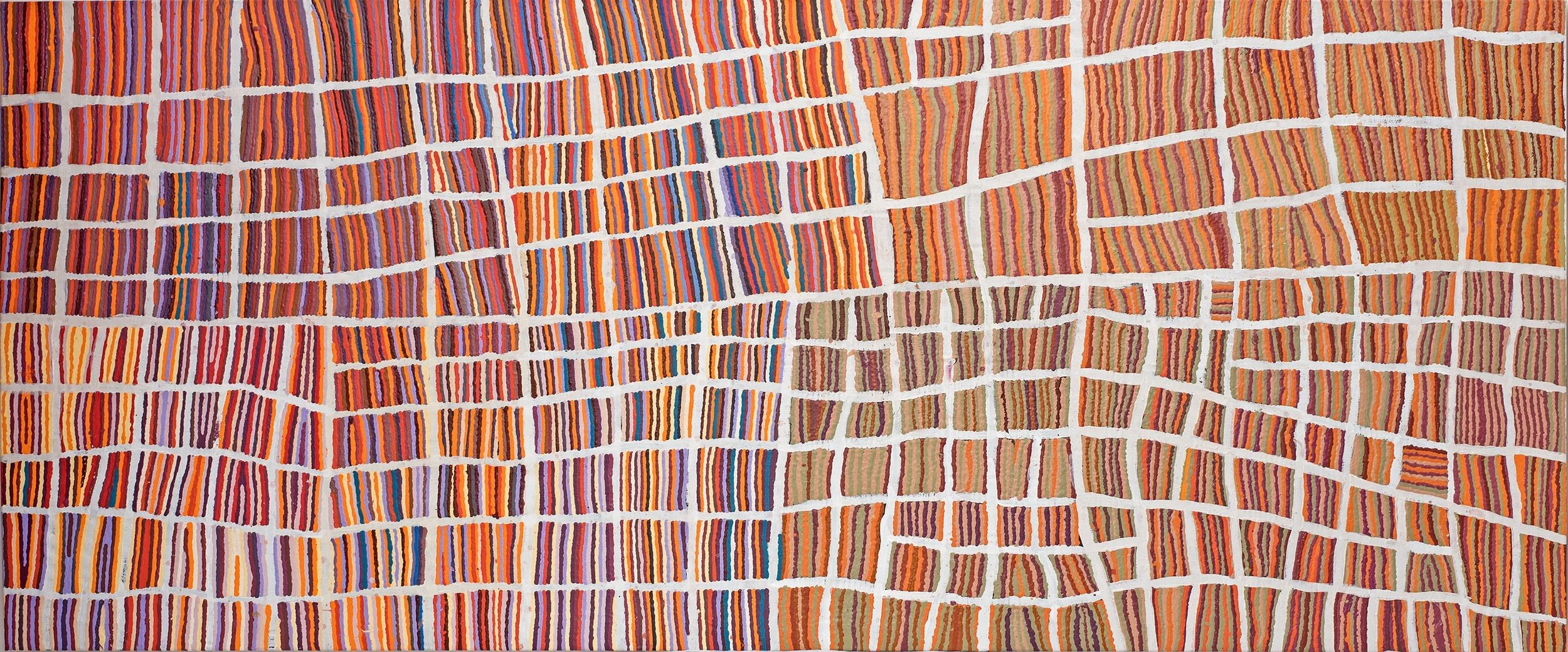Wokka Taylor et Nancy Karnu Taylor - Jantinti - 300 x 122 cm - 18-150 (sold)
Wokka Taylor et Nancy Karnu Taylor - Jantinti - 300 x 122 cm - 18-150 (sold)
Artistes : Wokka Taylor (1939) et Nancy Karnu Taylor (1941)
Titre de l'œuvre : Jantinti
Format : 300 x 122 cm
Provenance et certificat : centre d'art aborigène de Martumili
Référence de cette peinture : 18-150
Vendue
Explications pour cette œuvre :
Jantinti, big claypan. Long way from here; no hospital, no school, no shop to buy food. But too much bush tucker! Minyarra (bush onion), kalaru (edible seeds ground to make a flour for damper) and yiwinji- too much! You can grind the seed from those ones and put him in the waru (fire), make a damper. You can’t have him like that, raw one. Kitirrpa, that’s another bush tucker. Little short one warta (bush, shrub), but plenty there. Jamarlpa, lungkunpa. You can also find him for huntng parnajalpa (goanna), jipuku (rabbit), pussycat. Wet time parnajalpa kurnu (sleeping). Plenty jipuku been there, but he finished now, gone. I like jipuku. Winjikirti there been plenty too, and mirtarra. Mirtarra, he finished now, all gone. He would make a home in the parna, in the grass. All the old people go there, go Jantinti to get kalaru.
Jantinti ngayu mili (my) country. I been grow up there from the little kid. Ngayu mili nyamu (grandfather's) country and ngayu mili nana (grandmother's) country. Same like that for Wokka [Taylor, Karnu’s nyupa (husband)], he been there from little kid too.
Wokka been grow up in Kulyakartu and Kirriwirri side, his country side. When he come down looking for people he come down Karlamily side. He came with his family. That time everybody all gone , only us living in the desert. He found us with a waru.
Light him up waru, [and it’s] just like a telephone. You see the smoke, know somebody there. His mummy and daddy been bring him and all his sisters, all his brothers, they came to Jantinti. Jantinti Country belong to everybody. Plenty time they been stay there, until Wokka been run away right up to Parnngurr rockhole. He met up with Ngamaru [Bidu’s] mob there. Then he kept going, run away to work in Ethel Creek.
[We had been living in Jantinti country for a time with Wokka's family] when we walk[ed] right up to Jigalong. We had already met up with [sisters] Mulyatingki, Nyanjilpayi and May Wokka, their two little brothers and their mummy. We been come through Yandicoogee, Stock River. Nobody been pick us up. We been walking; me and my brother Minyawe. My mummy and daddy were gone then. We been passing through Oakover River when whitefellas, women and man picked us up in a cattle truck, Christian mob. That whitefella, he from Kimberley. He been give us flour, he been cook plenty flour for us. We been tell him no good! We were bushmen people you know? Can’t have it [processed flour]!
They drove us all the way to Balfour Downs, where we stayed for one night. From Balfour Downs we got picked up in the Jigalong truck. When we got there to Jigalong I saw Wokka again. [He was] still young fella. That’s when he became my nyupa.
He’s been my nyupa since then, only one, good fella. We started working, mustering work. Together we went to Roy Hill Station. We worked there a long time together, but we finished when all the sheep died. No water. We went back home to Nullagine.
Then we went to Maralinga Station, we worked there too. Wokka been ride a horse, stockman Wokka. I been do the cleaning up in house and mustering up the sheep. We worked for many years on stations, too much time! [Eventually] we went to Strelley, everybody had their family there. We were there with Don Mcleod mob. I been stay there long time. We came down to Parnngurr after, staying in Parnngurr one way.
© Photo : Aboriginal Signature Estrangin gallery & text with the courtesy of the artists and Martumili

